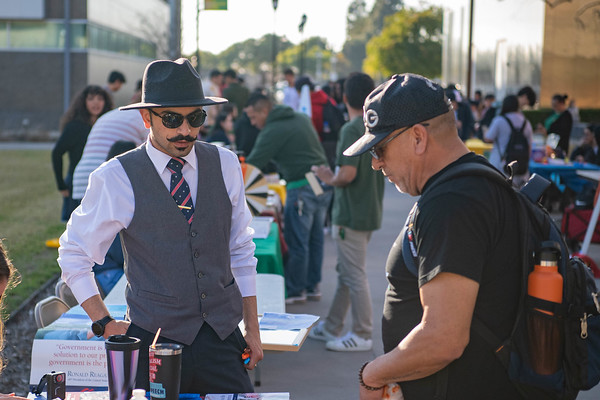Huntington Beach, CA — When a Golden West College student who fled Iran described illegal immigration as a “cancer” and called to eradicate Hamas, the school’s College Disciplinary Officer didn’t defend his free speech rights from those who sought to silence him—she threatened the student with discipline.
Now that student and others are fighting back to defend their First Amendment rights.
The Institute for Free Speech has filed a federal lawsuit in the U.S. District Court for the Central District of California on behalf of Matin Samimiat, Annaliese Hutchings, and Young America’s Foundation (YAF). The suit challenges the college’s unconstitutional speech policies and their enforcement. The case arises from the students’ efforts to establish a YAF chapter on campus and speak openly about controversial political and social issues.
After months of resistance, the YAF chapter finally received official recognition in March 2025. However, Golden West continued to weaponize speech policies to threaten the students. During a February 2025 campus Club Expo, the students displayed a whiteboard on campus encouraging students to “change my mind” about their messages including “Illegal immigration is a cancer upon any society” and “Hamas is a terrorist organization, and they must be wiped from the face of the earth.” Following complaints, the college’s Director of Student Life, Stephanie Smallshaw, summoned YAF Chapter President Samimiat to a meeting.
Smallshaw warned Samimiat, joined by YAF Vice President Hutchings, that they would face discipline for continuing to express these views, claiming the cancer metaphor “dehumanizes a group of people” and could be “harmful to people who have experienced cancer.” Regarding Hamas, Smallshaw insisted their statement could “incite violence” and that they should stop using “offensive language” because “some students here believe Hamas is not a terrorist organization.”
When Samimiat pushed back, citing his firsthand perspective of growing up in Iran—a country he described as “the biggest supporter of Hamas”—Smallshaw dismissed his personal experience and told him it was “not his responsibility” to create environments for students to engage with difficult topics.
When Samimiat then reported that other students had directed vulgar personal attacks at him—including telling the Iranian-born American citizen to “Go back to your f*cking country”—Smallshaw suggested that the students’ own “provocative language” expressing conservative viewpoints triggered these personal attacks.
“The First Amendment exists precisely to protect the speech that others would want to silence,” said Institute for Free Speech Vice President for Litigation Alan Gura. “Students shouldn’t have to guess what speech is allowed or fear punishment for taking any political stance. College administrators can’t pick and choose which views are acceptable or silence students simply because their constitutionally protected opinions might offend others.”
“I left Iran to enjoy the amazing freedom that the United States offers,” explained Matin Samimiat, who recently celebrated his third year as an American citizen. “Now I find myself threatened with punishment for expressing political opinions—because they happen to be opinions that administrators don’t like.”
“College is supposed to be a place where students can engage with different ideas,” added Annaliese Hutchings. “Instead, Golden West College is teaching students that certain widely-held political opinions are off-limits—and that merely expressing these opinions is somehow ‘harmful.’”
The lawsuit argues that the disciplinary code provisions are unconstitutionally vague, overbroad, and selectively enforced against conservative viewpoints. It seeks to enjoin the enforcement of these speech restrictions and establish that administrators violated plaintiffs’ First Amendment rights.
To read the complaint in Samimiat, et al. v. Smallshaw, click here. To visit our case page, including photos for media use, click here.
About the Institute for Free Speech
The Institute for Free Speech promotes and defends the political speech rights to freely speak, assemble, publish, and petition the government guaranteed by the First Amendment.













